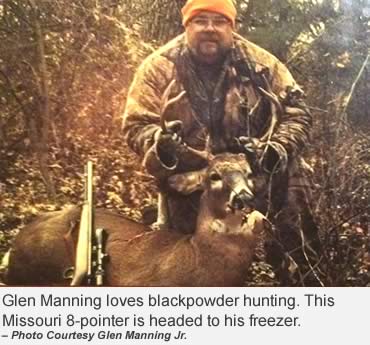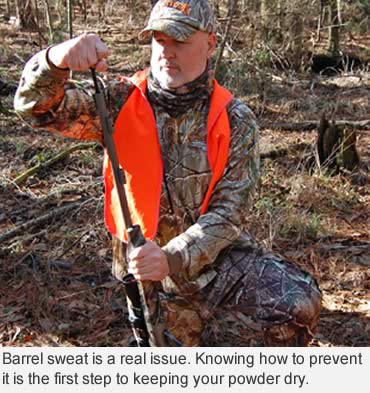By Glen Manning Jr.
When it comes to deer hunting, some things we simply learn the hard way.
Even though I’ve spent years reading as much as I possibly can to learn about this wonderful sport, I’ve made many mistakes this past decade, and still do.
Unfortunately, this was the case with learning about barrel sweat. Yes, guns can sweat! The results can be disastrous, as I discovered.
I was hunting with a blackpowder rifle in my home state of Missouri, and the hunt was starting out well. A hefty doe appeared about 20 yards upwind, and I told myself this would be easy venison for the freezer.
Slowly, I raised my muzzleloader, steadied my sights on its vitals and squeezed the trigger.
 Nothing happened.
Nothing happened.
By the faint “pop,” I knew the primer had ignited, but not the main charge.
I continued to hold the sights on the doe’s shoulder, like you are supposed to do with any misfiring blackpowder weapon in case there is a delayed reaction in the ignition of the charge. (By the way, the potential of a delayed discharge is something all muzzleloader hunters should be aware of.)
I did my best to remove the spent primer and insert a new one without spooking the now-wary doe.
Just as I got the new primer inserted and started to shoulder my rifle, she bolted.
How frustrating!
The powder (pellet) had somehow gotten wet. But it was not raining, nor had my rifle been exposed to any wet conditions.
Later, while telling other blackpowder hunters about the mystery, I learned that the inside of a muzzleloader barrel can “sweat,” thus causing the powder to become moist enough to cause a non-fire or a slow-burning delayed ignition, which is quite dangerous.
 So, what causes barrel sweat?
So, what causes barrel sweat?
I’d kept my muzzleloader inside a warm house, so when I went outside and exposed it to the cold, humid air, condensation formed inside the barrel, just like reading glasses fog up when you walk outside on a humid day.
When I loaded my gun, I was unknowingly pushing my powder charge and sabot through a long, wet tube.
Here’s the solution: Leave your muzzleloader (unloaded) in a truck, or hanging in a barn or screened-in porch so barrel condensation won’t occur when traveling from a warm, dry environment to a cold, humid one.
I hope my tip will help other hunters keep their powder dry and avoid a frustrating or dangerous situation.
– Editor’s Note by Tim H. Martin
Hunters who use centerfire weapons in the far north often practice what Glen Manning learned the hard way.
A firing pin will sometimes freeze completely if a firearm comes out of a warm house and is suddenly exposed to frigid air. Condensation forms inside the action, freezes quickly and prevents the firing pin from operating properly.
Like Glen, many northern hunters store firearms in the cold when the thermometer plummets well below freezing.
If you have a unique or special tip you’d like to share with Buckmasters fans, please email it to huntingtips@buckmasters.com and, if chosen, we will send you a cap signed by Jackie Bushman, along with a knife!
Read Recent Tip of the Week:
• Create a Realistic Rattling Sequence: When bucks fight, they create noises other than just antlers clashing together. Here’s a tip for a realistic rattling sequence.